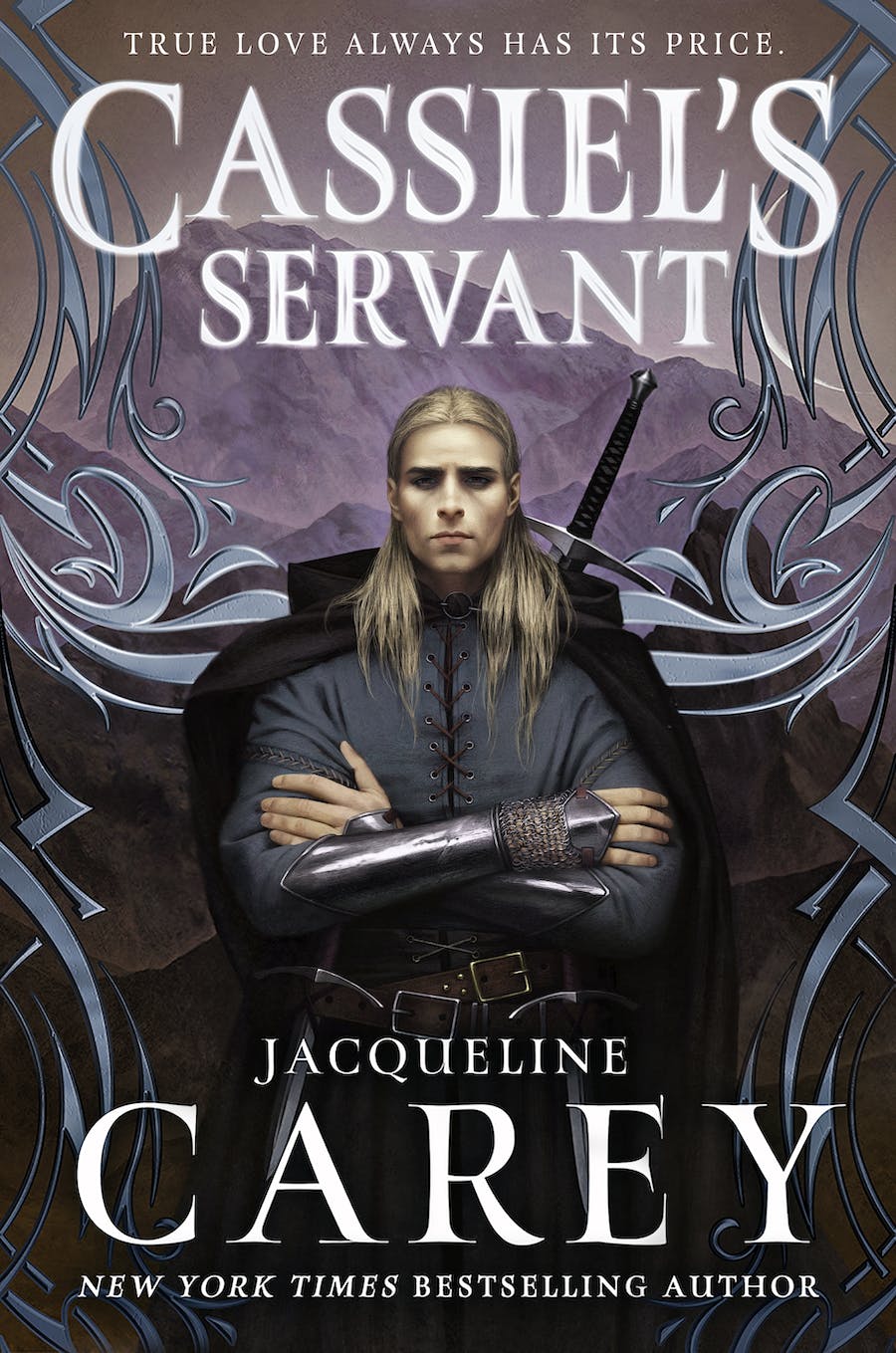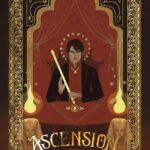
Genres: Fantasy, High Fantasy
Representation: Bi/pansexual love interest, secondary bi/pansexual character, minor M/M
PoV: 1st-person, past-tense
Published on: 1st August 2023
ISBN: 1250208351
Goodreads

The lush epic fantasy that inspired a generation with a single precept: “Love As Thou Wilt."
Returning to the realm of Terre d’Ange which captured an entire generation of fantasy readers, New York Times bestselling author Jacqueline Carey brings us a hero’s journey for a new era.
In Kushiel’s Dart, a daring young courtesan uncovered a plot to destroy her beloved homeland. But hers is only half the tale. Now see the other half of the heart that lived it.
Cassiel’s Servant is a retelling of cult favorite Kushiel’s Dart from the point of view of Joscelin, Cassiline warrior-priest and protector of Phèdre nó Delaunay. He’s sworn to celibacy and the blade as surely as she’s pledged to pleasure, but the gods they serve have bound them together. When both are betrayed, they must rely on each other to survive.
From his earliest training to captivity amongst their enemies, his journey with Phèdre to avert the conquest of Terre D’Ange shatters body and mind… and brings him an impossible love that he will do anything to keep.
Even if it means breaking all vows and losing his soul.
“Decadent and dark, Cassiel’s Servant reveals the secrets of the mysterious Cassiline brotherhood. In this gorgeously realized novel, Carey returns to the world of Terre d’Ange and offers us a new and dazzling perspective on a character we thought we knew.”—Nghi Vo, author of The Chosen and the Beautiful and Siren Queen
I received this book for free from the publisher via NetGalley in exchange for an honest review. This does not affect my opinion of the book or the content of my review.
Highlights
~the Cassiline Brothers are so a cult
~who’s gonna tell them pride is a sin???
~Skaldia was a lot worse than we thought
*spoilers abound for anyone who hasn’t read Kushiel’s Dart!*
I read Kushiel’s Dart and Cassiel’s Servant back-to-back, and I’m still not sure if that was a good idea or not. Cassiel’s Servant does not compare well – but in fairness, what book could? And yet Servant seemed to be written expecting the reader to be very familiar with Dart indeed – some conversations, and some entire scenes, were glossed over with quick summaries rather than giving us a play-by-play, presumably because we already know how this conversation or that scene goes. So if you haven’t read Dart for a while, you may be a little lost in those moments – or feel a little cheated out of the story. Despite the heavy page-count, those glossing-over moments – which start when Joscelin meets Phedre – made Servant feel rushed to me, as if Carey didn’t really want to linger over the same story she’d already told in Dart.
Which I would normally think is pretty fair, but if you didn’t want to write the story again, why write a companion novel like this?
Joscelin’s voice is very different to Phedre’s, but while that is good writing craft – in the sense that it would be odd if two such different characters had similar voices – it made for a much less enjoyable reading experience for me. One of the things I love about Dart is the lushness, the decadence, the beautiful language – and with Servant, there’s none of that, because of course, Joscelin thinks things like decadence are…not ‘sinful’ exactly, but definitely not something to be encouraged. His descriptions of things, then, are much simpler and less ornate than Phedre’s – and that does not make it a bad book; it just makes it one that is unappealing to me specifically.
What I think is genuinely odd about Servant is that, I’m not sure we actually get much more insight into Joscelin as a character than we had before – and some of what we do get feels very forced. For example, we learn that during his training as a Cassiline, Joscelin had a best friend he was incredibly close to; arguably the most important relationship he’d ever had with anyone up to that point, up to and including his family (who, after all, he left when he was ten years old). But this is pretty jarring, because if this friendship was so important, was this important, how is this the first time we’re hearing about it? How did it never come up in Dart, or Chosen, or Avatar? And the reading experience of Servant is made strange by it, because – why doesn’t he mention it now? Only he can’t, because he never did in Dart, and although Carey does give us a few conversations and smaller scenes between Joscelin and Phedre that didn’t make it into Phedre’s account, in order to keep things believable those conversations and scenes have to be pretty minor and unimportant, or else why wouldn’t Phedre have talked about them in Dart?
I’m not sure if this is bad writing so much as it is an inevitable trap of writing this kind of a companion novel. Carey’s hands are tied by what she wrote decades ago for Dart. There’s no way around that.
(So perhaps it’s better to go into Servant not having reread Dart first? Because it might read better, if you don’t quite remember how everything is going to go already.)
Putting this next bit behind a spoiler tag, although it’s really a very minor spoiler: View Spoiler »
Going in a very different direction: wow do I hate the Cassiline Brotherhood. Like, violently hate it. Their – philosophy? faith? both? is hateful and appalling and in direct conflict with, you know, everything else about Terre d’Ange. As in, the Brotherhood literally thinks D’Angelines shouldn’t exist, and are definitely sinning (or something – still not sure sinning is the right word) by enjoying beauty and sex. Oh, and that women, specifically, are Wicked But Weak. (One of the great things about Servant is that Joscelin is clearly narrating from many years later, and is not shy about calling out his past self’s misogyny or hypocrisy, or that of the Brotherhood. This is a great relief, and sometimes wryly funny.)
And from a worldbuilding perspective… I don’t understand how the Brotherhood exists. I really don’t understand how their faith evolved out of Cassiel’s existence. If I were imagining what a group of people who sought to emulate Cassiel might be like, the Brotherhood are absolutely not it. They’re basically a tiny cult within Terre d’Ange who believe everyone else is – not damned, but fundamentally wrong in their very existence, and that someday Cassiel will save everyone, including Elua, by convincing them all to go to the quasi-Christian Heaven instead of the paradise realm that is the D’Angeline afterlife.
What even.
I was expecting – waiting for, even – for the Brotherhood to be great advocates of platonic love, and for some discussion or debate about the merits of platonic vs romantic or erotic love. But that didn’t happen. And we already know Cassilines swear celibacy, and that that’s in emulation of Cassiel – but I wasn’t prepared for the disgust with which the Brotherhood views sex itself. You can be celibate without thinking sex is disgusting and sinful, and given, you know *gestures at the whole of Terre d’Ange* the sex-negativity (is that a term?) feels so impossibly out of place.
To be clear, these are things I, subjectively, did not like about the worldbuilding – but I also think that, objectively, they make very little sense.
On the other hand, we know the Brotherhood is dying out, and maybe this – the fundamental conflict between the Brotherhood’s views and everyone else’s – is a big part of why? But if that’s the case, then I would have liked for that to have been stated, and discussed. It could have made for some really interesting discussion! Instead, there’s only talk about how the Brotherhood has become less fashionable, which doesn’t seem to be the same thing.
Obviously, Joscelin’s life before meeting Phedre is the biggest difference – plot-wise – between Servant and Dart. That’s a given. So…what does Joscelin’s perspective on events we already know add to the familiar story?
Honestly? Not a lot, in my opinion. As previously mentioned, there are a few small snapshot-scenes that are original to Servant – and I was amused to see that very occasionally, Phedre and Joscelin remembered conversations just a little differently – but some of the ones I was hoping for are missing: for example, Joscelin summarises for us the night he spends entertaining Morhban’s soldiers as a storyteller – we don’t actually get to see how that night went. We never hear the story Joscelin came up with to explain how a Mendicant came to possess Cassiline daggers and vambraces – which particularly crushed and frustrated me; it was something I was so looking forward to hearing, and what’s the point of this kind of companion novel if you skip over the things that Phedre wasn’t around for?
And what I said about the change of voice (Phedre -> Joscelin) affecting the prose – well, Joscelin’s worldview strips away most of what makes Dart – and all three trilogies set in this world – unique. Without the sensuality and sexuality of Dart, we’re left with a story that is…not dull, because these are objectively exciting events. But it’s Phedre’s perspective, and the D’Angeline culture as a whole, that transforms Dart from an interesting High Fantasy into something really groundbreaking and special. Joscelin’s perspective and culture (because he really was effectively raised in another culture entirely) not only does not offer that – the D’Angeline view – specifically; it offers us nothing new in exchange. If anything, it takes away from the story and world we know, rather than adding anything to it. It diminishes it.
It takes something that was breathtaking and beautiful, and reduces it to…just another fantasy novel. Not bad. But nothing special.
That line from the blurb – ‘The lush epic fantasy that inspired a generation with a single precept: “Love As Thou Wilt.”’ That book was Kushiel’s Dart. Cassiel’s Servant would not, could not, and does not, inspire.
As a standalone, Cassiel’s Servant is perfectly fine. Not mindblowing, not terrible, just – fine.
But the Perfect Companion, it most certainly is not.







You’re not wrong. Though I think you underestimate the writing a little. After all, Joscelin’s distaste for the Cassilines’ doctrines, and the ugliness they persuaded him to believe, was woven through all of Phèdre’s side of the story.
He isn’t such an interesting narrator, but the horrible nature of the Cassilines and their total anachronistic, nonsensical dictates are basically canon from the first time Phèdre meets Joscelin. One part I found most interesting was his perception of Delaunay – in contrast to Phèdre’s hero-worship – as rather exploitative and certainly not all-knowing.
But, you’re right. It’s not a book I will go back to over and over again for the sheer pleasure of the world it creates, but I still wouldn’t be sorry to see more of these. I think later books will provide Carey a lot more freedom to be creative, given the significant length of time he and Phèdre spend apart in Chosen and Avatar. Though, I don’t doubt that Darşanga will be significantly more harrowing through Joscelin’s eyes.
The horrible nature of the Cassilines is canon, but I only realised how little sense it made reading this book, which is why I mentioned it – I think I didn’t notice it nearly as much in Phedre’s books, which makes sense, so it was pretty shocking being dunked in it in Servant. Plus, even if you don’t mind it from a worldbuilding perspective, it’s not exactly fun to read. Sometimes all a storyteller’s decisions can be defended, but add up into a book that’s not enjoyable. I think that’s my main issue with Servant: I was probably never going to enjoy a book from Joscelin’s POV, even if I didn’t realise that until I was reading it.
I did think Joscelin’s take on Delaunay was great, though, and a good contrast to Phedre’s view of him. I wish I’d mentioned that in my review!
I think Carey’s actually said that she doesn’t plan to write more Joscelin books any time soon, for pretty understandable reasons.
Ah, thanks for the link! I checked her site for updates last year and spent the rest of my time googling the question, so I’d not seen it. I can really understand her position on that one.
As for the Cassilines making no sense, I kind of took that to be about religious extremism – which never makes sense, right? It’s the precursor to her work on the Patriarch in the Moirin trilogy, in a way. Some people get weird ideas in their heads, and surround themselves with other people who won’t challenge them, and eventually a whole community becomes totally divorced from reality and their wider social context. So I suppose, while they definitely don’t make any sense, that doesn’t stop it ringing true to me – especially with the ultimate outcome of Chosen involving one of them going totally off the rails (and, to be honest, on other points of morality David de Rocaille seemed less crazed than the rest of the Cassilines!).
Anyway, I really liked your review. I’m also kind of thrilled to meet someone who knows the books as well as I do. XD I’ll be keeping an eye on your blog for new reads.
You’re welcome! It’s very easy to miss her updates, I can never get the subscription to her site to work. But yes, me too, I don’t blame her one bit for not wanting to continue.
That’s a very good point – religious extremism never does make sense… I think I’ve been having trouble lately with ‘that doesn’t make sense’/’but humans do it anyway’, I keep meaning to write a post about it. Might be an issue with me as a reader, honestly.
Thanks! I’m genuinely delighted you liked it, and thinky-discussion is always MUCH appreciated :D I hope I can find you some great new reads. (Although as good as the Kushiel Universe??? Probably not!)